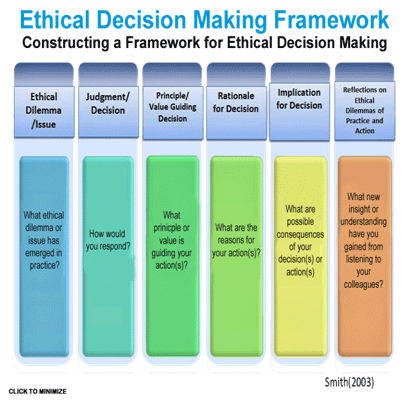Special Assignment Lesson Plan: Ethical Reasoning
Attention

Learning Outcomes
Upon completion of this lesson's material, students will be able to
- Apply ethical reasoning using an ethical decision framework
Teaching
So what is ethical reasoning?
Good question.
According to the Association of American Colleges and Universities, ethical reasoning is “reasoning about right and wrong human conduct.” For example, I have very strong opinions on certain crimes committed by individuals and feel the punishment for said crimes should be swift and merciless. I know, however, these are my beliefs, and I am sure there are many who would not agree. When discussing ethics, we cannot discount an individual’s core beliefs and values, their personal biases and opinions, views of integrity and honesty, and their individual interpretations of subjects or events.
These beliefs, values, and opinions belong to each of us. They are a result of our upbringing, our religious beliefs, our educational backgrounds, our experiences, and our core “sense of self.” We all live by our own moral/ethical code and most of us try to do the right things and to be a good person with the hopes that this will ensure the best possible outcomes in most situations. We don’t often STOP and really reflect on our own ethics and why we have them, where they came from, and what shapes and defines them.
Think about your own moral/ethical code.
- you have issues you are passionate about?
- Do you believe people should always tell the truth?
- Do you have a strong opinion about the death penalty?
- Why do you think you have these strong beliefs?
- Where did they come from?
- Your parents? Grandmother? The Bible and early religious teachings?
- Can you remember some of the teachings your family "preached" to you as you were growing up, and do you still abide by these beliefs today?
Now think about people you know who think differently about ethical issues than you. You must know some. How do their beliefs differ from yours? Why do you think that is? Are you able to discuss your differences with these people OR do you definitely have topics you do not talk about when you are together? At the end of the day, are you "free to disagree" or do these discussions leave you feeling angry and resentful?
Ethical reasoning involves assessing our own core values in the context of social problems and in different settings and reflecting on how different ethical perspectives might yield different outcomes in various ethical dilemmas.

Assessment
Assignment
For this assignment, please choose one of the scenarios listed below. Using the Ethical Decision Making Framework above, answer the six bulleted questions below. Don’t forget, you have read the NAEYC Code of Ethical Conduct (many times) and this might be a useful tool to refer to when completing this assignment.
Your paper must be two-pages and include the following:
- Describe the ethical dilemma/issue
- Describe what principles or values guide your action(s).
- Discuss the reasons for your action(s)
- Describe the possible consequences of your decision(s) or action(s)
- Describe the additional insights or perspectives you have gained from others
Have fun with this!
Scenario One Your best friend since middle school, Trish, owns and runs a family childcare in her home and has hired you to work for her. After your first week, you are unsure about what to do. You have observed many incidents you did not like and did not feel were appropriate. Trish has left you alone with all 12 children three times so she could run to the store to get food to feed the children (gone over an hour each time.) There are two children in her care with diagnosed disabilities. Sally is three and uses almost no words. Trish often yells at her to “use your words” and this usually results in Sally having frequent tantrums. She does not play with the other children so Trish turns on the television and puts her in a booster seat in front of the TV for 1-2 hours. The other child is a five year old male with ADHD. He is constantly getting into everything he can in the house—Trish also yells at him, calls him a “heathen” and often sends him outside to play alone for 1-2 hours. Her back yard is not fenced in.
Scenario Two You work in a public school preschool and you have a 4 year old child you have concerns about. He only uses 3-4 words, does not play with the other children, and has very few self-help skills. You have done multiple observations on Jimmy and have spoken to his parents three times about your concerns. The last time you approached the father with your concerns, he became agitated, raised his voice, and told you to “mind your own business.” Your supervisor wants you to make a referral to CDS; when you mention this to both parents at pick up, they tell you, “He is just a little slow. We’re not worried. He’ll catch up. His older brother did.” Don’t make any referrals—we’re just going to wait and see what happens.”